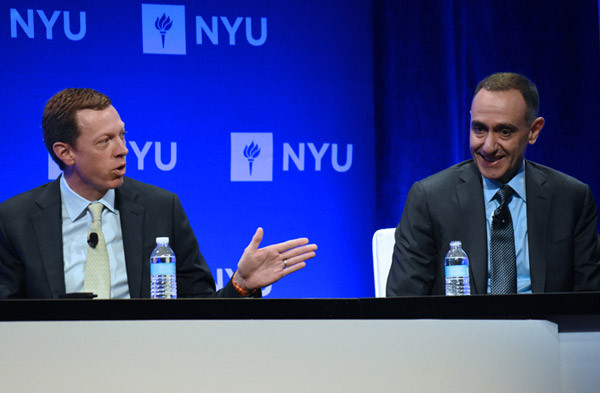✕

Column: industry Tag: hotel executives,scale,Hospitality Industry Published: 2017-06-14 16:13 Source: Author:

Kevin Jacobs (left), of Hilton, speaks during a hotel leaders’ session during the NYU International Hospitality Industry Investment Conference. Also pictured is Elie Maalouf, of InterContinental Hotels Group. (Photo: Bryan Wroten)
NEW YORK—The hotel executives who sat on the “The leaders check in—Part two” session at the NYU International Hospitality Industry Investment Conference?gave attendees some insight into the current state of the hotel industry while also addressing the importance of scale.
Industry overview
Every conversation is about the length of the cycle, said Mit Shah, senior managing principal and CEO of Noble Investment Group. A year ago, someone speculated the game is cricket instead of baseball, he said, and he finds that even more interesting today.
“It’s hard to follow, you don’t know what the rules are,” he said. “It’s complicated. It feels like you’re there a long time, which is what 2% to 3% (revenue per available room) growth feels like.”
The United States has had eight years of 2% gross-domestic-product growth, said Elie Maalouf, CEO of the Americas at InterContinental Hotels Group, and the country is still running on it.
“It leaves a lot of headroom moving forward,” he said. “I’m pretty optimistic.”
Business goes up and down, said Kevin Jacobs, EVP and CFO at Hilton, but the global mega trend is a massive middle-class formation that wants to travel at will. The industry can be part of that trend and have an impact on those travelers’ lives, he said.
“That’s a really fun place to be and a really important place to be,” he said.
Technology is going to change the economy, Jacobs said, so the way technology affects hospitality jobs over the next 10 to 20 years is “the great socioeconomic event of our lifetime.”
Steve Haggerty, global head of capital strategy, franchising and select service at Hyatt Hotels Corporation said hoteliers should stop trying to figure out the cycle. The focus now should be to “keep your heads down” and control what can be controlled, he said. Eventually there will be a bad jobs report, and then the industry will readjust its plans. Things will be great until they’re not, he said, but until then, keep plowing ahead.
The importance of scale
Scale certainly matters, Haggerty said. Hyatt?added eight brands in 12 years, he said, and while that in itself is not sufficient, the company takes a hyper-focused look at a particular customer and how to serve that customer deeply.
“You invest in data, and to do that, you have to have some scale,” he said.
The company even looks at the purpose of customers’ travel and how to serve them and add experiences relevant to them, Haggerty said, ensuring there’s an ecosystem that covers each of their purposes.
It can ultimately get to RevPAR premiums and the circumstances where it achieves loyalty and to keep building on that in a quality way, he said, but capital is required.
The number of rooms Marriott International has relative to Hyatt doesn’t matter from the company’s strategic point of view, Haggerty said.
“The opportunity to own the higher-end customer base potentially is as available to us now, if not more than beforehand,” he said.
Scale clearly matters, Maalouf said. It’s also important to have scale where it matters in markets that matter in segments that matter, he said.
“That’s what we believe is our strategy,” Maalouf said.
Not every brand is going to grow its RevPAR index, Shah said. One of his properties has a 98% RevPAR index, he said, and the key in how to make money is 98% is where it’s going to be at in the marketplace. When he speaks with other owners, Shah said, they don’t say they want a brand that is going to outperform, but they’ll have one that lets them win at a 95% RevPAR index.
Looking ahead
The fundamental indicator Maalouf said he likes to look at is corporate profits. Gross domestic product and monthly jobs reports are lagging indicators, he said. Corporate profits drive the wealth of the nation and drive hiring.
Ultimately, leisure depends on the health of corporations hiring people and making them feel comfortable traveling, he said. Corporations making more money invest more and hire more people.
People’s demand for travel has basically become a right, said Chris Cahill, CEO of luxury brands at AccorHotels. Where they go, how they go and when they go has changed, and they will move to different places and continue to travel, he said. The fundamentals are still so strong, he said, so while the planning perspective is more volatile, the industry will still see people traveling.
Previous:Emaar aims for growth with owner-friendly deals
Next:Experts explain new developments in foreign investment
Hot key words
Hot Products
Popular Vendors